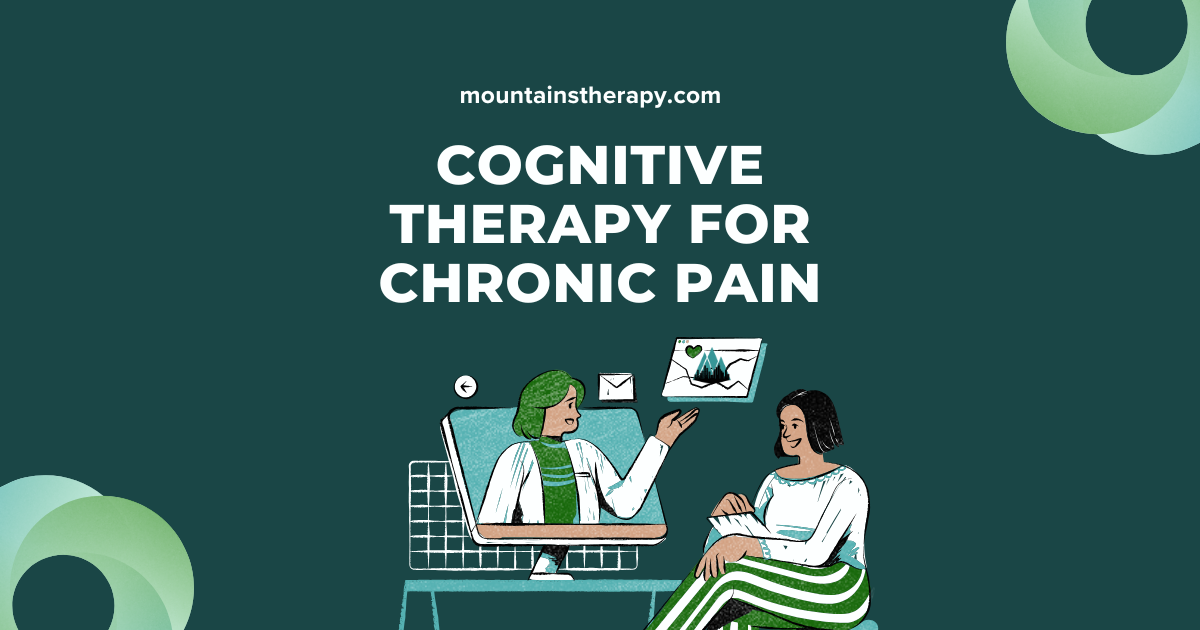Cognitive Therapy for Chronic Pain: Finding Relief and Strength
Learn more about Chronic Health Issues Therapy and Cognitive Behavioral Therapy - CBT.
In This Blog, You’ll Learn:
- How Cognitive Therapy helps manage chronic pain by reshaping thought patterns
- The benefits of Cognitive Behavioral Therapy (CBT) for chronic illness and emotional resilience
- Practical strategies to balance activity and rest while coping with chronic health challenges
- The role of individual therapy in addressing the mental and emotional impacts of chronic pain
- How Mountains Therapy provides personalized support for navigating chronic health issues
Living with chronic pain can feel overwhelming, especially when it seems like there’s no clear solution in sight. Chronic pain not only affects your body but can take a toll on your mental health, relationships, and overall quality of life. At Mountains Therapy, we understand that chronic health struggles require more than just physical treatment—your emotional well-being matters, too. That’s where Cognitive Therapy comes in as a powerful tool to help you manage pain, reclaim control, and live a more fulfilling life.
How Cognitive Therapy Helps with Chronic Pain
Cognitive Therapy, a form of individual mental health therapy, focuses on the connection between your thoughts, feelings, and behaviors. For those dealing with chronic pain, unhelpful thought patterns like “I’ll never get better” or “This pain controls my life” can worsen your emotional distress and even amplify the pain itself. Individual therapy helps you identify these patterns, challenge them, and replace them with more supportive, realistic ways of thinking.
At Mountains Therapy, our chronic health issues therapists provide a safe, compassionate space to:
- Explore the emotional impact of chronic pain.
- Develop skills to manage stress, anxiety, and depression that may accompany pain.
- Cultivate a stronger mind-body connection to reduce your pain's intensity.
Cognitive Therapy for Chronic Health Issues
Chronic health issues like autoimmune conditions, fibromyalgia, or persistent fatigue can leave you feeling helpless. Cognitive Therapy provides a structured approach to help you navigate these challenges, address negative thought cycles, and improve your overall quality of life. By focusing on how you think about your condition, Cognitive Therapy helps reduce the emotional burden of chronic illness and fosters resilience. With the guidance of a chronic health issues counselor, you can:
- Learn to recognize and reframe unhelpful thoughts that contribute to feelings of hopelessness or despair.
- Develop problem-solving skills to manage the daily frustrations of chronic illness.
- Build self-compassion and confidence as you adapt to your condition.
.
Cognitive Behavioral Therapy (CBT) for Chronic Illness
Cognitive Behavioral Therapy (CBT) is an evidence-based approach widely used to treat chronic illnesses. It combines Cognitive Therapy techniques with behavioral strategies to create meaningful changes in both thoughts and actions. For individuals managing chronic pain or long-term health conditions, CBT provides tools to:
- Reduce emotional reactivity to pain and discomfort.
- Implement relaxation techniques and mindfulness to calm the nervous system.
- Set realistic goals to regain a sense of control over your life.
At Mountains Therapy, our individual therapists offer personalized CBT plans to address the unique needs of those dealing with chronic illness. We emphasize collaboration and practical solutions to help you live a life that feels manageable and meaningful. Working with an individual mental health counselor trained in CBT can help you:
- Identify the behaviors that worsen your pain (e.g., overexertion, avoidance).
- Develop pacing strategies to balance activity and rest.
- Learn coping skills to manage flare-ups and setbacks effectively.
The Role of Therapy in Chronic Health Issues
If you’re struggling with ongoing health challenges, you’re not alone. Working with a chronic health issues counselor or engaging in chronic health issues counseling can make a world of difference. Chronic health conditions often leave people feeling isolated or misunderstood. Our approach emphasizes whole-person healing—helping you not just survive but thrive. Through individual counseling, we can work together to:
- Process emotions like frustration, grief, or anger about your condition.
- Build healthier coping strategies to navigate day-to-day challenges.
- Restore hope and motivation to engage in life fully.
Why Individual Therapy Matters for Chronic Pain
Pain is personal, and your healing journey should be, too. Individual therapists create tailored plans that reflect your specific needs and goals. Whether you need support addressing your mental health, exploring the deeper impacts of your pain, or creating practical strategies to improve your daily life, individual mental health counseling can help.
Our individual mental health therapists at Mountains Therapy use evidence-based techniques like Cognitive Therapy to empower you to:
- Recognize how thoughts and behaviors influence your pain experience.
- Develop skills to reduce the emotional and mental burden of chronic pain.
- Feel seen, heard, and validated in your struggles.
You Don’t Have to Manage Chronic Pain Alone
Chronic pain can feel like it’s stealing your life, but therapy offers a path forward. With the right tools and support, you can reshape your relationship with pain and find relief that lasts. If you’re looking for a compassionate chronic health issues therapist or an experienced individual mental health counselor, Mountains Therapy is here to guide you every step of the way. Healing begins with hope and we’re here to help you find it. Check out our website to learn more about chronic health issues therapy and how we can support you on your journey to wellness.











